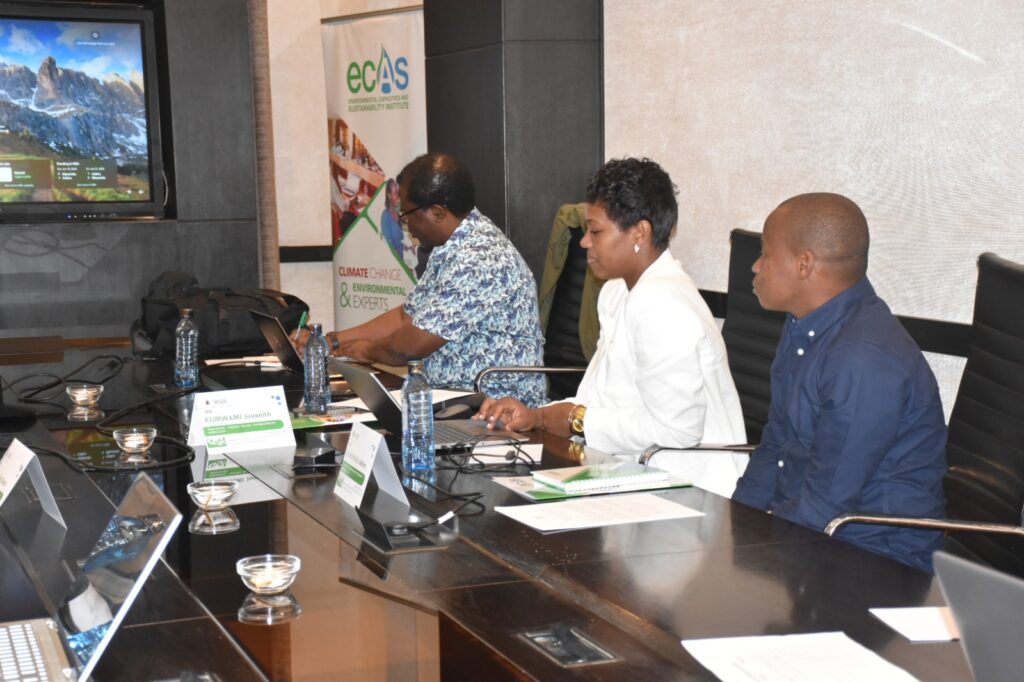
CONCEPT NOTE
INTERNATIONAL TRAINING ON PREPARING A GREENHOUSE GAS INVENTORY UNDER THE ENHANCED TRANSPARENCY FRAMEWORK
COURSE BACKGROUND
Climate change remains one of the most pressing global challenges of our time. Tracking greenhouse gas (GHG) emissions accurately and transparently is vital for assessing the effectiveness of climate mitigation efforts and for achieving the objectives set by the Paris Agreement. A robust national greenhouse gas inventory (NGHGI) forms the cornerstone of this process.
This course, developed by ECAS Institute, is designed to provide foundational knowledge and practical guidance on the Enhanced Transparency Framework (ETF) under the United Nations Framework Convention on Climate Change (UNFCCC). It equips professionals and institutions with the tools needed to prepare, maintain, and report GHG inventories in line with international standards and national commitments.
The course introduces the IPCC guidelines, principles of Measurement, Reporting and Verification (MRV), and the structure of NGHGI systems, offering a practical roadmap to climate accountability and progress tracking.
COURSE OBJECTIVES OF THE TRAINING
The course aims to:
- Build awareness and understanding of UNFCCC reporting requirements and the role of transparency in climate governance.
- Introduce the basic methodology and principles for compiling a national greenhouse gas inventory.
- Explain the implications of the Enhanced Transparency Framework for national reporting systems.
- Support countries in establishing systematic, reliable, and consistent NGHGI processes.
WHAT YOU WILL LEARN
By completing this course, participants will be able to:
- Understand the purpose and components of the UNFCCC reporting system and ETF.
- Describe the IPCC guidelines used for GHG inventories.
- Recognize the structure, cycle, and methodological elements of a national GHG inventory.
- Identify key steps for aligning national inventory systems with ETF requirements.
DURATION AND PROGRAM
TARGET PARTICIPANTS
The course is intended for a cross-sectoral audience involved in climate action, including:
- Policymakers and policy administrators
- Climate change officers and environmental researchers
- Development practitioners in government and NGOs
- Members of civil society and rural development organizations
- Academics and students in environmental policy, sustainability, and climate studies
TRAINING MODULES
| No | Module | Details | |
| 1. | Introduction to Reporting Requirements under UNFCCC and the Enhanced Transparency Framework |
This lesson provides a conceptual foundation on transparency in climate action and outlines the evolving obligations of countries under the UNFCCC and the Paris Agreement.
Topics:
|
|
| 2. | The National Greenhouse Gas Inventory (NGHGI) |
This lesson introduces the core components of a national GHG inventory, including the technical steps and institutional arrangements needed to prepare and maintain it.
Topics:
|
|
| 3. | Quality Assurance and Quality Control (QA/QC) in GHG Inventories |
Focuses on establishing and implementing QA/QC procedures to ensure the accuracy, consistency, and transparency of inventory data.
Topics:
|
|
| 4. | Inventory Management Tools and Continuous Improvement |
Covers the use of digital tools, data management systems, and iterative improvement processes to support an efficient, up-to-date GHG inventory.
Topics:
|
|
TRAINING STYLE
The modules will be taught through PowerPoint presentations, and lectures and will include a case study/field visit, breakout sessions, case studies and other interactive discussion components.
The course will also include a few guest speakers, both in person and via Zoom and other online learning platforms for overseas speakers. This provides useful real-world insights alongside the more theoretical aspects of the course.
The conference faculty shall consist of experienced decision makers, as well as practitioners and representatives from established educational and research institutions active around climate change, engineering and international development. Throughout the course, theoretical presentation of concepts will be moderated and more group discussions and plenary engagements will be optimized. PowerPoint presentations will be made by facilitators and resource persons, to highlight key concepts before embarking on group work.
GENERAL NOTES
- Training manuals and additional reference materials are provided to the participants.
- Upon successful completion of this course, participants will be issued with a certificate.
- We can also do this as a tailor-made course to meet organization-wide needs. Contact us to find out more: info@ecasiafrica.org.
- Payment should be sent to our bank account before the start of training and proof of payment sent to: info@ecasiafrica.org.
ABOUT ECAS INSTITUTE
The ECAS Institute designs and delivers independent and targeted training, research, and consulting services. Our work focusses on climate change and resilience building, carbon markets, renewable energy, nature-based solution, biodiversity conservation, agriculture and food systems, We are located in Nairobi Kenya and work across the African region. We have implemented training and research assignments in Kenya, Tanzania, Uganda, South Sudan, Somalia, Malawi, Rwanda, Congo, and South Africa. Globally, we have supported our partners from the UK, Denmark, Italy, Sweden, Germany, and USA.

